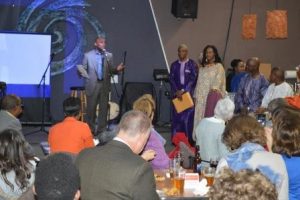Denver Mayor Pleased with Global Ebola Response


[/media-credit] Denver Mayor, Michael Hancock speaking at an Ebola Eradication Campaign Gala in Denver, March 19.
The good news is that the region is seeing a decline in deaths associated with the disease and the infection rate continues to go down. In Sierra Leone, the get -to-zero Ebola Campaign aims to bring the infection rate to zero within 60 days.
But we are also being told — it’s not over yet. That is because while there is a decline in infection rates and deaths, new cases continue to emerge. Moreover — the infrastructure in the affected countries needs massive repairs and improvements to prevent future outbreaks.
Thousands of miles away in Colorado, communities with links and ties to Sierra Leone, Liberia, and Guinea, the countries hardest hit by the disease, remain worried. The members of the community are raising money for medical supplies and other equipment to boost the system needed to abate the disease in their native countries.
So they were joined by Denver Mayor, Michael Hancock, on March 19 for the Ebola Eradication Campaign Fundraising Gala.
The mayor proclaimed the day, Stick-It-To-Ebola-Day in what he said was an effort to stamp out the disease and be in solidarity with the affected peoples and countries.
“I am happy to see the African community come together and raise awareness to address this very critical crisis, “Hancock said. “When Sierra Leone and Liberia and Guinea fell victim to the Ebola virus, all of us felt their pain, and felt their sorrows and mourn for loss.”
Without calling names, the mayor said he did not want to let the countries most capable of dealing with the situation off the hook. “Don’t let countries who are capable of responding to these kinds of crisis off the hook,” he said.
A lot of super-power countries, now being praised for bringing Ebola under control, received criticism for their slow response when the disease began to spread across international boundaries in 2014.
In America, news that the disease was here created panic and a media frenzy that quickly became the source of many late-night jokes and political ridicule. Meanwhile–people infected with Ebola died from the disease in the U.S.
The media may be gone, but Liberia still needs help.
“Even though the cameras are not there, there are still people who are hurting,” said Naquetta Ricks, a native of Liberia who was the Mistress of Ceremonies at the event.
To do their part, community leader, Abdul Sesay with the Denver Office of Economic Development and a native of Sierra Leone, announced that they are working with Colorado-based Project C.U.RE to procure and send medical equipment to the affected countries.
Why Ebola Happened?
Speaking at the event, Project C.U.R.E CEO, Douglas Jackson alluded to some of the root causes of Ebola in West Africa. He said the problems go beyond the temporary fixes that are being applied today. This includes fixing the devastated medical infrastructure in the affected countries.
Jackson believes the decade-long civil war that the countries went through, now almost forgotten, compounded an infrastructure system that was already in disrepair and needed attention.
After the war, no one went back to rebuild, he told the community that was gathered at the Santa Fe Arts District in Denver.
“When the war stopped we all went about our business, and nobody ever went back into those hospitals to start to rebuild, “Jackson said. “ This is the reason we are here tonight. It’s not just about Ebola. It’s about repairing a healthcare infrastructure for people who really need it the most.”
